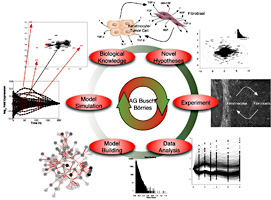Research
|
||
| The group of Melanie Börries focuses on the development and verification of mathematical models for cellular behavior and cell communication from an initial stimulus to the final phenotype. | ||
 click to enlarge |
||
| In a systems biology approach we combine experimental research on cell-cell communication with the development of appropriate multi-scale dynamic models to investigate the necessary and sufficient control points that lead to cell proliferation, differentiation, migration or death. We adapt concepts from non-linear dynamics and complex systems to develop appropriate dynamic models unraveling self-organizing properties in cellular behavior. Such behavior in a multicellular environment is most likely the results of time-sequential events, involving protein signaling and gene regulation in feedback-entangled processes lasting several hours. Systems theory suggests that the slowest evolving variables determine the long term outcome of a system. In a biological context, it is thus the change in gene expression that reflects the macroscopic decision of a cell. Formalizing these ideas in a dynamic modeling approach, we use neural network and rule based modelling approaches to reconstruct the dynamic control logic of cellular decision processes based on gene expression kinetics. Time-resolved experimental data will be recorded in our lab under well defined cell culture and context-dependent conditions. Data is collected on the cell population level using DNA microarrays and RT-PCR as well as on the single cell level by time-lapse microscopy. The work in the Börries laboratory is funded by the German Cancer Consortium (DKTK), the Freiburg Institute for Advanced Studies (FRIAS), the BMBF programmes Gerontosys I, II and eBio as well as the DFG Schwerpunkt InKoMBio SPP 1395. |
||

